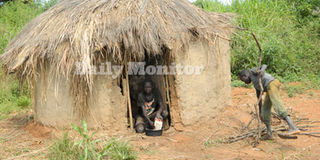Domestic violence affecting children education in Apac

Needy. Alex Odongo washes utensils while his younger brother, Felix Elida, picks firewood at their home in Tarogali Village, Apac District, on February 5, 2020. PHOTO BY SANTO OJOK
What you need to know:
- The children, who live in dilapidated structures at Tarogali Village, were orphaned as a result of domestic violence after their mother, Sylvia Amuge, killed their father, Moses Otim, following a domestic brawl in 2016.
- Mr Bob Orech, the community development officer of Ibuje, said the sub-county is working in partnership with Aids Information Centre, a local non-governmental organisation, to offer support to such vulnerable families.
Local leaders in Tarogali Parish, Ibuje Sub-county, Apac District, have attributed school drop-out cases to domestic violence and abject poverty.
Mr Tom Edola, the chairperson of Tarogali Village in Tarogali Parish, says many children cannot persue education because their parents cannot afford to send them to school.
He identifies a family of six children who have been trying to make ends meet without their parents.
The children, who live in dilapidated structures at Tarogali Village, were orphaned as a result of domestic violence after their mother, Sylvia Amuge, killed their father, Moses Otim, following a domestic brawl in 2016.
“People are just looking at these children and no one is bothered about helping them,” he said on Wednesday.
Amuge was then arrested and taken to court over manslaughter. She was found guilty and was sentenced to 18 years in prison.
The convict was later sent to Luzira prison to serve her sentence, leaving behind their seven children.
The family’s older son, Kenneth Kula, 21, took charge, caring for his other siblings. They were residing in two grass-thatched huts, which later collapsed.
In 2018, their then bread winner, Kula, also disappeared from home in search for a job. Following Kula’s disappearance, three children decided to go and live with their grandmother in Kwania District.
Currently, Alex Odongo, 14, is in charge, providing support to his other brother, Felix Elida. Odongo works as a casual worker in the neighbourhood.
However, because of his inability to raise school fees, Odongo and Elida have all dropped out of school.
Odongo had been a Primary Four pupil while Elida was in Primary Two, all at Alenga Annex Primary School in Ibuje Sub-county.
“When our elder brother left home in 2018, we dropped out of school since there was no one to buy for us food, books, pens, and uniforms,” Odongo said.
Mr Bob Orech, the community development officer of Ibuje, said the sub-county is working in partnership with Aids Information Centre, a local non-governmental organisation, to offer support to such vulnerable families.
“I will make sure they are considered so that they can have a better future,” he said.
Child rights
In 1989, the world made a promise to protect every child and fulfil their rights by adopting an international legal framework – the United Nations Convention on the Rights of the Child. On August 17, 1990, Uganda joined the list of states that signed, ratified or acceded to the Convention.



